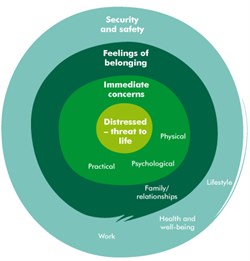Transforming care
The NCSI is a partnership between the Department of Health and
Macmillan Cancer Support. Published in January 2010, it summarised
a range of evidence about the care and support available for people
living with and beyond cancer , and suggested that traditional
follow up arrangements - usually involving regular out-patient
appointments in an acute hospital - are not meeting all their needs
of . The vision identified five key shifts necessary to
transform cancer care and support from a one-size fits all approach
to follow up to personalised care planning based on assessment of
individual risks, needs and preferences:
- Information and support from point of diagnosis
- Promoting recovery
- Sustaining recovery
- Managing consequences of treatment
- Supporting people with active and advanced disease
The Recovery Package

The 'Recovery Package' is a combination of different
interventions, which when delivered together, will greatly improve
the outcomes and coordination of care for people living with and
beyond cancer.
It supports a more proactive approach to cancer care and
rehabilitation, and empowers people to manage their own care
through giving them the appropriate, relevant information and
support to do so. Overall, it aims to increase the well-being of
people living with and beyond cancer, and to reduce unnecessary
hospital visits.
Holistic Needs Assessments (HNAs), Care Plans and Health and
Wellbeing events are all part of the Recovery Package.
 ● Holistic
Needs Assessmentsare used to identify a concern and allow a
subsequent consultation to focus on that particular need. Concerns
appear under different sections such as lifestyle, physical or
emotional concerns, encouraging a wide range of issues to be
raised. A Care Plan can then be developed, in response to the
identified to ensure that care is proactive and support services
are planned and accessed appropriately.
● Holistic
Needs Assessmentsare used to identify a concern and allow a
subsequent consultation to focus on that particular need. Concerns
appear under different sections such as lifestyle, physical or
emotional concerns, encouraging a wide range of issues to be
raised. A Care Plan can then be developed, in response to the
identified to ensure that care is proactive and support services
are planned and accessed appropriately.
● Health and Wellbeing events are education events to enable
people to gain confidence to take control and participate in their
recovery and promote positive lifestyle change, through providing a
range of information, e.g. About returning to work, financial
support, getting involved in physical activity and other local
services which are available.
● A Treatment Summary is a document produced at the end of a
person's treatment to provide GPs and patients with important
information, including side effects and/or late effects of
treatment, signs and symptoms of recurrence and a summary of
information given to the patient about their cancer and any future
GP actions to support the patient.